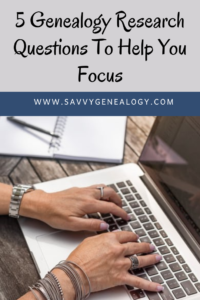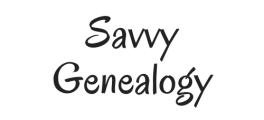5 Genealogy Research Questions to Help You Focus
Ah, research. Is there nothing better in the world to a genealogist? For me, I love to research! I love the detective work. My character traits fit very well in this area, but I still have to ask myself some basic questions to keep myself focused. We get to talk about those genealogy research questions in this article today.

Genealogy Research Questions: Who is the Informant?
This is a little bit of genealogy jargon. I had never heard of this term before I did my genealogy degree. It basically is who was the person that gave the information to the clerk or recorder. Why is that important to know? Because if that person was close to your ancestor, then the information is more accurate. That’s the bottom line anyway.
For example, a mother is an excellent informant when it comes to the birth of her child. She was there, she didn’t get the information second-hand, she was very close to the event when it happened. So your ancestor or a close relative such as a spouse, child, grandchild, etc. have more credibility then other witnesses when giving information.
What Information is Included?
Is it just their birth year? Or is it their birth month, day, and year? Did the record have any notes attached that could clarify the little information that’s there? How much or how little is included on the record? Is there more on the record than what the record was used for. For example, a death record primarily records death information, but it can have lots of other information about the deceased person. It could have birth information, parent’s names and their birthplaces, relationships, etc.
Also, missing information can be a clue. If you know that your ancestor had 5 children from talking with your aunt, but you only see four children on census records, then you know you need to dig deeper into that. That’s why we as genealogists say a person had this many known children. You never know when another one will pop up on you later.
When Was the Record Created?

Dates really do matter. It actually can make or break your project. I’m not talking about the death date on a death record. I’m talking about when the recorder or coroner made the record after the person died. Or when the clergyman wrote the birth information in their birth register after the mother gave birth. Did he record it once a month? Or did he do it immediately after the event?
Census records are a good example of this. They are made every ten years in the U.S. So if your ancestor was born between those ten years, then that birth information is less accurate until you find their birth record. Their birth record will be more reliable because it was made closer to their birth then the census record was.
Where is the Event Recorded?
Boundaries change all of the time. So where is that record stored now? I like to look at old maps or research boundary changes because that leads me to the record. Also, I have to keep in mind the social customs of the day. Depending on the time period, you either can find that birth record in a church or in a civil government repository. So again, these things matter!
Marriage records are a good example for this because they are more fluid and can be stored in many different spots. They can also be created in many different spots. You may be searching for your ancestor’s marriage record in one county because that’s where they lived. But in reality your ancestor hopped the county line or the county line changed that year and now that record is made in the next county over.
Why Is That Event Important?
We know that certain events are huge milestones. Births, marriages, and deaths will always be recorded. But what about immigration records? Why were they recorded? And why does that matter to you?
I have a Norwegian grandmother who came over to America in 1912. Why? What was happening in her country that motivated her to leave? I found out that it was the jobs. There were no jobs for the young adults and she was 18 years old at the time. So it probably was pretty natural for her to start over in America since she didn’t see much in Norway at the time. So knowing the “why” of that record matters.
Last Thoughts on These Genealogy Research Questions

Do you already ask these genealogy research questions as you search for your ancestors? Then you are heading in the right direction. Like I said, these questions can either make or break your research. Especially when you have conflicting information from multiple records. But, don’t worry! We all face these sticky spots and even the best of us still gets stuck when working out confusing information. Just keep going and ask for help along the way. Also, all the major genealogical websites have Help Centers that can answer your questions. Here is Family Search’s Help Center for example.
And as always…good luck and happy hunting!
Tiffany
P.S. Related Reads…
- 5 Proven Steps To Research Your Family Tree
- 5 Genealogy Tools to Make Your Research Easier
- 2 Ways to Keep Genealogy Fun When Researching
beginner research, family history research, genealogy research, records
